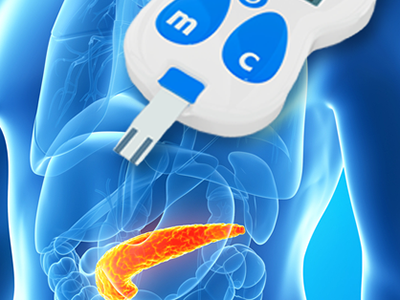Study of Transcription factor Foxo1 role in Glucagon Mediated Hepatic Glucose Production could lead to Potential Therapeutic Drug for Diabetes.
Source: Texas A&M University Jan 01, 2019 6 years, 3 months, 3 weeks, 4 days, 13 hours, 31 minutes ago
A recent study led by researchers in Texas A&M University's department of nutrition and food science shows how a novel regulatory mechanism serves as an important biomarker for the development of diabetes, as well as a potential therapeutic target for its prevention.
The study can be found online in the November edition of the diabetes journal of the American Diabetes Association.
"Glucagon and insulin are the most important pancreatic hormones in target tissues, such as the liver, in control of proper glucose levels in response to food intake," explained Dr. Shaodong Guo, Texas A&M AgriLife Research scientist in the department of nutrition and food science at Texas A&M University, College Station.
Guo was primary investigator and corresponding author for the study, which involved several other researchers from the department. Additional participation in the study came from the department of endocrinology at Third Military Medical University, Chongqing, China; the division of endocrinology, department of medicine, Johns Hopkins University, Baltimore, Maryland; and the department of chemistry, Cleveland State University, Cleveland, Ohio.
During fasting, Guo said, glucagon is secreted from pancreatic a-cells to elevate blood glucose, protecting the body from hypoglycemia. Glucagon also has been tied to the development of diabetic hyperglycemia, mainly through enhancing hepatic glucose production, or HGP.
Transcription factor Foxo1, a protein that plays an important role in regulating the expression of genes, promotes HGP through increasing expression of genes encoding the rate-limiting enzymes responsible for glucose production, he said.
"Glucagon exerts its function through binding to a G-protein-coupled receptor or GCGR," Guo explained. "When the receptor binds with glucagon it stimulates the cell membrane, which in turn activates protein kinase A, or PKA, signaling for metabolic enzymes or gene expression to increase blood glucose."
Guo said an excess blood glucagon level is present in animals and humans with diabetes, stimulating excessive HGP and contributing to diabetic hyperglycemia.
"Disruption of proper hepatic glucose production serves as a major underlying mechanism for the development of
Type 2 diabetes," he said. "The pancreatic hormone glucagon increases HGP and insulin decreases it. Together, they control blood glucose homeostasis."
Guo said glucose production is suppressed by insulin involved in the gene transcriptional regulation in the nucleus of liver cells, and Foxo1 is an important component of insulin-signaling cascades that regulate cellular growth, differentiation and metabolism.
"The purpose of this study was to learn what role Foxo1 plays in how glucagon regulates HGP," he said. "We investigated the molecular and physiological mechanism of Foxo1 regulation through phosphorylation with the aim of better understanding the fundamentals of blood glucose homeostasis and the pathogenesis of diabetes."
Phosphorylation, the attachment of a phosphoryl group, is important for protein function as this alteration activates or deactivates almost half of the body's enzymes, regulating their function.
To establish ho
w this Foxo1 phosphorylation would work in an animal model, the researchers used CRISPR/CAS9 technology in the generation of Foxo1 'knock-in' mice to use in their investigation.
"Foxo1 is stabilized in the liver of fasting mice when insulin is decreased and glucagon is increased in the blood circulation," he said. "Stimulating the GCGR results in the activation of adenylate cyclase, an enzyme playing key regulatory roles in essentially all cells, and produces increased levels of intracellular PKA."
Guo said the study showed hepatic Foxo1 deletion in the mice significantly reduced hepatic glucose production and blood glucose.
"This result, along with what we learned from some the previous research done in conjunction with the department, showed we had identified a novel molecular, cellular and physiological mechanism by which Foxo1 mediates glucagon signaling via phosphorylation to control hepatic gluconeogenesis and blood glucose," he said.
Guo said this study further demonstrated that Foxo1 is a mediator of multiple signaling cascades and integrates different hormones and intracellular protein kinases into the programming that controls insulin sensitivity, HGP and blood glucose.
"A high glucagon level is present in both Type 1 and Type 2 diabetes, and Foxo1 plays a key role in the fundamental mechanism leading to excess liver gluconeogenesis and resulting in diabetic hyperglycemia," Guo said. "This suggests glucagon-mediated HGP could be a significant potential therapeutic intervention for the control and possible prevention of diabetes."
Reference:Yuxin Wu, Quan Pan, Hui Yan, Kebin Zhang, Xiaoqin Guo, Zihui Xu, Wanbao Yang, Yajuan Qi, Cathy A. Guo, Caitlyn Hornsby, Lin Zhang, Aimin Zhou, Ling Li, Yunmei Chen, Weiping Zhang, Yuxiang Sun, Hongting Zheng, Fred Wondisford, Ling He, Shaodong Guo. Novel Mechanism of Foxo1 Phosphorylation in Glucagon Signaling in Control of Glucose Homeostasis. Diabetes, 2018; 67 (11): 2167 DOI: 10.2337/db18-0674
